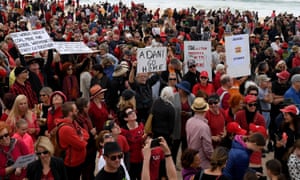The Adani Group has said it will “break ground within days” on the rail link for its Carmichael coalmine and has claimed daily progress on a project for which it still needs to secure about $5bn in finance.
The Adani Mining chief executive, Jeyakumar Janakaraj, said in a statement on Friday the company remained “confident and committed” to delivering its first coal shipment in March 2020.
Janakaraj said pre-construction works on the Galilee basin mine site and the 388km rail corridor to its Abbot Point port were “well advanced”.
“Every day we are moving forward. Milestones are being achieved every day,” he said.
“We will break ground within days to mark the official start of work on the rail link.”
Adani’s announcement on Friday coincided with the release of another poll showing a significant majority of Australians were opposed to the mine.
Roy Morgan’s survey of 1,547 people last weekend found 77% of those who had heard of the mine thought it should not go ahead.
This included a majority of voters of all political stripes who were against the mine, including 55.5% of National party supporters. Almost a quarter of people surveyed hadn’t heard of Adani.
Adani is yet to secure a federal government concessional loan of up to $900m for the rail line through the Northern Australia Infrastructure Facility.
Its most recent deadline for financial closure on the mine and rail project is still months away, and the Indian energy group is looking overseas to secure finance by March.1
Adani also has to refinance $1.48bn of borrowings on the Abbot Point port by November 2018 and a cumulative debt of $2.11bn – more than the port is worth – by 2020.
A recent report by the Institute for Energy Economics and Financial Analysis (IEEFA) said a looming shortfall in coal throughput at Abbot Point meant the prospect of the Carmichael mine filling that gap was critical to Adani’s refinancing bid on the port.
This week, Westpac joined another of the port’s original financiers, Deutsche Bank, in appearing to rule out refinancing because of a new climate policy mandating investments only in existing coal basins.
Adani is also yet to register an Indigenous land use agreement with the mine site’s traditional owners amid continuing legal challenges from within the group.
An Adani spokesman did not return calls on Friday.
IEEFA analyst Tim Buckley predicts that for the first phase of production, Adani will have to spend $2bn for a mine digging out up to 25m tonnes of coal a year, and $3.3bn for the rail project.
Adani has spent $3.5bn in Australia so far, all of it funded through debt, including more than $2bn on the port and $680m to buy the mine site land from Linc Energy and Clive Palmer.
Janakaraj said in the statement that the pre-construction work, funded by an injection of up to $400m from Adani Enterprises in India, included teams doing “cultural heritage inspections and recordings” at the mine and rail sites.
The Adani Mining chief executive, Jeyakumar Janakaraj, said in a statement on Friday the company remained “confident and committed” to delivering its first coal shipment in March 2020.
Janakaraj said pre-construction works on the Galilee basin mine site and the 388km rail corridor to its Abbot Point port were “well advanced”.
“Every day we are moving forward. Milestones are being achieved every day,” he said.
“We will break ground within days to mark the official start of work on the rail link.”
Adani’s announcement on Friday coincided with the release of another poll showing a significant majority of Australians were opposed to the mine.
Roy Morgan’s survey of 1,547 people last weekend found 77% of those who had heard of the mine thought it should not go ahead.
This included a majority of voters of all political stripes who were against the mine, including 55.5% of National party supporters. Almost a quarter of people surveyed hadn’t heard of Adani.
Adani is yet to secure a federal government concessional loan of up to $900m for the rail line through the Northern Australia Infrastructure Facility.
Its most recent deadline for financial closure on the mine and rail project is still months away, and the Indian energy group is looking overseas to secure finance by March.1
Adani also has to refinance $1.48bn of borrowings on the Abbot Point port by November 2018 and a cumulative debt of $2.11bn – more than the port is worth – by 2020.
A recent report by the Institute for Energy Economics and Financial Analysis (IEEFA) said a looming shortfall in coal throughput at Abbot Point meant the prospect of the Carmichael mine filling that gap was critical to Adani’s refinancing bid on the port.
This week, Westpac joined another of the port’s original financiers, Deutsche Bank, in appearing to rule out refinancing because of a new climate policy mandating investments only in existing coal basins.
Adani is also yet to register an Indigenous land use agreement with the mine site’s traditional owners amid continuing legal challenges from within the group.
An Adani spokesman did not return calls on Friday.
IEEFA analyst Tim Buckley predicts that for the first phase of production, Adani will have to spend $2bn for a mine digging out up to 25m tonnes of coal a year, and $3.3bn for the rail project.
Adani has spent $3.5bn in Australia so far, all of it funded through debt, including more than $2bn on the port and $680m to buy the mine site land from Linc Energy and Clive Palmer.
Janakaraj said in the statement that the pre-construction work, funded by an injection of up to $400m from Adani Enterprises in India, included teams doing “cultural heritage inspections and recordings” at the mine and rail sites.

No comments:
Post a Comment